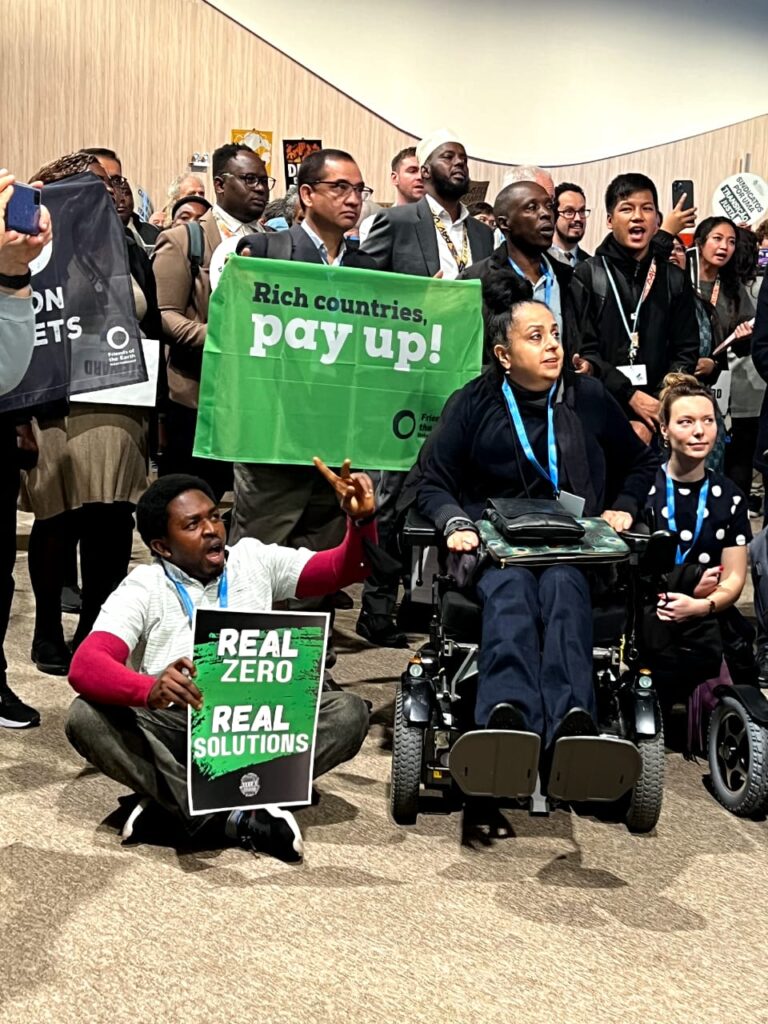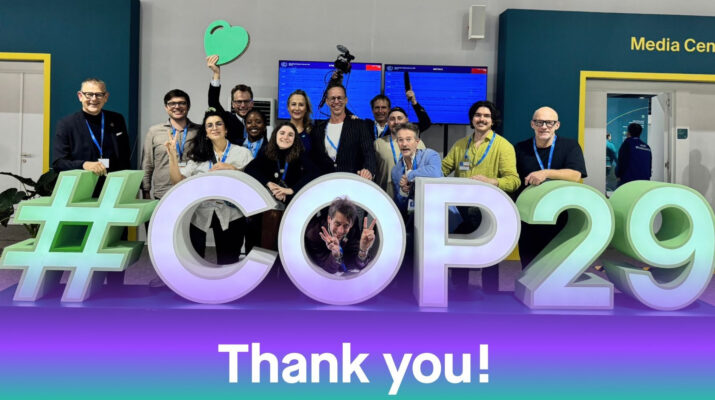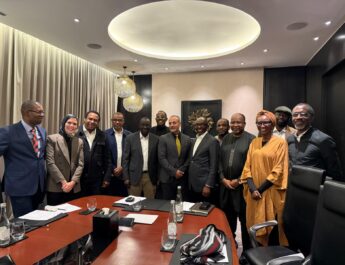The just concluded United Nations Conference of the Parties (COP29) in Baku, Azerbaijan, may have ended on a poor and disappointing note, but the big win for Africa and other developing countries is the resolution for rich nations of the Global North to fund climate resilience initiatives in poorer countries with $1.3 trillion as against $300 billion yearly till 2035.
By Edu Abade
Thousands of participants at the just ended 29th edition of the United Nations Conference of the Parties (COP29) judged it ‘poor and disappointing’. And they are right! It was at best one conference with many different voices. The disagreements have to do with ‘interests’ and the political economy of the climate change crises.
While countries of the Global North and their ally-Saudi Arabia-prefer continued extraction and exploration of fossil fuels combined with investments in renewable energy sources, Africa and other developing countries, which contribute about 3 percent of total global greenhouse emissions, favoured drastic reduction in methane. They have also called on the Big Polluters to pay countries of the Global South huge compensations in trillions for the climate imbalance created by their extractive activities.
Groups Canvass Vigorous Methane Reduction
Specifically, We Don’t Have Time, the world’s largest media platform for climate action and the Exponential Roadmap Initiative launched the global #BuyMoreTime campaign to push for rapid cuts in methane by 2030 to avoid reaching irreversible and self-reinforcing tipping points.
In pushing to achieve reducing emissions by half in 2030, it revealed that over 94 percent of leading global scientists believe that the goal was no longer achievable, but insisted that the campaign must sustain its push for legally binding targets.
Citing a report by global scientists, it said: “Methane is the biggest contributor to global warming among all short-lived climate pollutants. But it is has a lifespan of only seven to12 years. This means that if we simply stop emitting it, methane levels in the atmosphere will rapidly decrease, thereby reducing global warming by up to 0.5°C.
“We need to intensify our efforts to phase out fossil fuels and accelerate the green transition across all sectors in all countries. But by drastically cutting methane and other super pollutants, we would buy ourselves more time to stabilize global temperatures as close to 1.5°C above pre-industrial levels as possible.”
Insisting that the momentum is growing, it said 158 countries, the European Union (EU) and 140 companies have already committed to cutting methane emissions by 30 percent by 2030, while over 30 countries, responsible for nearly half of global methane from organic waste, endorsed the declaration to reduce emissions.
“But for these drastic reductions to happen, pledges must become legally binding agreements. We’ve done it before: the 1987 Montreal Protocol eliminated 99 percent of all ozone-depleting substances and allowed the ozone layer to heal. We can do this again – with methane and other super-pollutants,” the group stated.
 Promoters of the campaign encouraged business leaders, policymakers, scientists and individuals to sign the #BuyMoreTime letter, requesting UN Ambassadors from the countries of the undersigned to champion a new UN protocol for quickly reducing emissions of methane and other short-lived climate pollutants.
Promoters of the campaign encouraged business leaders, policymakers, scientists and individuals to sign the #BuyMoreTime letter, requesting UN Ambassadors from the countries of the undersigned to champion a new UN protocol for quickly reducing emissions of methane and other short-lived climate pollutants.
Founder and CEO of We Don’t Have Time, Ingmar Rentzhog, said: “Methane emissions stem from only three major industry sources and it is an unwanted waste product that won’t affect anyone’s business if we take it away. Thanks to new technology, methane leaks can be identified from space with unprecedented accuracy. We have the solutions, we have the will. Now all we need are binding agreements to make it happen.”
Chief Executive Officer and Co-Founder of the Exponential Roadmap Initiative, Johan Falk, said: “Cost-effective solutions to halve methane emissions by 2030 exist. We need strong action and policy to scale them exponentially now.”
Also, Director, Potsdam Institute for Climate Impact Research and Co-Chair, the Exponential Roadmap Initiative, Professor Johan Rockström, noted: “The Montreal protocol is a successful, legally binding, global framework, where a minority of countries in the world had a phase-out plan that spilled over to all the countries in the world. Doing something similar for methane and other non-CO2 gases would definitely be beneficial, because in the Montreal Protocol countries are held accountable.”
Germany Backs $1.3 Trillion Climate Fund For Poorer Countries
Following the outcomes of the conference, the German government sought to draw some positives and talk up future goals with the Development Minister, Svenja Schulze saying: “The results from Baku are no cause for celebration, the progress made is too small for that but in future, more people will take on responsibility than before.”
Report indicated that the event, which was extended by about 30 hours (over a day) to resolve the financial commitments of participants, was close to failing before a compromise was reached.
However, several countries were still outraged at the outcome, with Nigeria’s representative calling the $300 billion earlier asked annually from industrialized countries until 2035 a “joke” and an “insult.”
Germany, meanwhile, sought solace in the wider possibilities that emerged with Schulze arguing that a commitment by a small group of industrialized countries will now become a “joint global task” to which other countries will also contribute, stressing: “That is an important signal.”
She pointed out that it was crucial that private investments worldwide are channeled into climate-friendly paths on a major scale. This was reflected by the new overall target of $1.3 trillion yearly through 2035 to help poorer countries fight climate change.
“This can be achieved through good framework conditions, government incentives and fair international cooperation,” Schulze said.
Economy Minister, Robert Habeck, focused on the same points, saying: “In view of the tense global situation, this is a success for international cooperation.”
The negotiations at the UN level were working, even if there were still many unresolved issues that would need to be discussed in the coming year, he noted.
“It is pleasing that the states have adopted solid rules for the carbon markets as part of the Paris Agreement and that these mechanisms can now be utilised,” Habeck stated.
Even holdouts such as Saudi Arabia “will not be able to stop the real market forces that have long since decided in favour of renewable energies and the climate-neutral transformation,” he added.
But German Foreign Minister Annalena Baerbock vehemently defended the decision of the UN Climate Conference for additional financial aid for poorer countries against sharp criticism from those nations, one of which called the agreement a “joke” and an “insult.”
“We know that our decisions today won’t alone be enough to meet all the needs,” Baerbock said in the wee hours of Sunday morning before the plenary session in Baku, the capital of Azerbaijan.
“This is why we got behind the vision of scaling up finance for developing countries to $1.3 trillion,” she said.
Of the $1.3 trillion agreed to be provided annually through 2035, some $300 billion is to mainly come from industrialized countries.
Baerbock said this could only be a starting point and she assured participants that Germany would deliver, adding: “Because we learned from our mistakes in the past – we cannot sign a check that will bounce – this is also about trust.”
She said the European Union (EU) is aware of its responsibilities insisting: “For the EU it is crystal clear: Nobody forgot about historical responsibility.”
Baerbock also stressed that climate protection financing and progress in reducing greenhouse gases could and should not be separated, maintaining: “Without concrete measures to keep the 1.5 degrees path within reach, no money in the world will save us.”
In an obvious reference to states like oil-rich Saudi Arabia, who are trying to block progress that moves nations away from oil, Baerbock said: “Those who have come here to prevent progress and to weaken our multilateral UN system altogether, have failed – badly. And those who believe in a better world have won.”
Africa MBPP Alerts To Carbon Market Talks
During the conference, the Africa Make Big Polluters Pay (MBPP) partners expressed deep concern regarding ongoing discussions surrounding Article 6 of the Paris Agreement, particularly as it relates to carbon markets, at the COP29 United Nations climate talks happening now in Baku, Azerbaijan.
On November 16, 2024, world governments concluded work on Article 6 and agreed to forward a draft text for consideration, further guidance and adoption at COP29.
However, the Africa MBPP believes the draft text raises significant issues that must be addressed to ensure equitable and effective climate action.
Article 6 of the Paris Agreement, which proposes how countries can collaborate to reach their climate targets, contains provisions – pushed through at the eleventh hour by the United States and the European Union – that risk placing carbon markets and offsets at the centre of the global response to climate change.
Carbon markets, or emissions trading schemes, are schemes that allow polluters – mostly from the Global North – to buy up cheap, imaginary “pollution allowances” from other countries and entities – mostly from the Global South, that have least contributed to climate change – that effectively allows the polluters to continue to pollute without consequence, escaping their moral and historical responsibility and worsening the climate crisis.
It also robs countries and communities in the Global South, including Africa, of the allowances they need to realise their right to grow and develop. In other words, those with humongous carbon footprints steal the ability to develop and survive straight from the hands of the countries and communities that have done the least to cause the climate crisis.
There is also overwhelming evidence that carbon markets do not work, and cause great harm. Attempts to launch the world’s biggest trading schemes failed miserably, in part because markets don’t actually decrease emissions; they just shift them around. The European Union’s emissions trading system (EU-ETS)—often used as the model for most other emissions trading systems—has not only failed to decrease emissions but, at one point, even correlated with an increase in emissions.
The EU-ETS also led to corruption, fraud, speculation and windfall profits for Big Polluters, which reaped the greatest benefits. Yet, it continues to be promoted and replicated as the gold standard.
Article 6 has been a focal point of contention, particularly the attempts to roll out dangerous global pathways for carbon markets under Articles 6.2 and 6.4 negotiations. The Africa MBPP partners stand firmly against carbon markets, as we believe they can undermine the integrity of climate action and disproportionately impact developing nations.
We commend the efforts of the SBSTA in facilitating discussions but note that the draft text now being proposed does not reflect a consensus among Parties, thus indicating unresolved divergences that could hinder progress.
We urge the CMA and COP to reject any text that did not have proper party consultation as a baseline, and any text that further legitimises these dangerous schemes in light of the abundance of evidence proving their worthiness and harm.
We also call for a transparent process that includes all options in the text, ensuring that the concerns of the African Group and Like-Minded Developing Countries (LMDC) are adequately represented.
“We support the recognition of “Mother Earth Centric Actions” and urge Parties to consider these perspectives in the ongoing negotiations. The Africa MBPP partners remain committed to advocating for climate justice and equitable solutions that empower vulnerable communities while ensuring that our planet’s ecosystems are protected. We call on all Parties to engage in constructive dialogue that leads to meaningful outcomes at COP29.
The Africa MBPP Coalition, comprising 27 members from across the continent, is committed to holding polluting corporations accountable for their significant contributions to the climate crisis. Through the MBPP Storytelling Platform, the group strives to illuminate the detrimental effects of transnational corporations’ extractive practices, challenge misleading and false narratives, and advocate for sustainable alternatives.
“Our mission is to humanise the climate crisis and inspire collective action. We firmly believe that industries such as agribusiness and fossil fuels must face financial and criminal accountability for the environmental damage they cause.”
Africa CSOs Back G77, China’s Support For Climate Finance Trillions, Technology Transfer
Civil society groups representing Nigeria and Africa under the auspices of the Africa Make Big Polluters Pay (MBPP) Coalition backed demand by developing countries led by G77 and China for improved and just climate finance reparation in trillions of dollars from developed countries.
They also advocated urgent technology transfer and capacity building for climate action in frontline climate crisis-impacted communities on the continent.
The Africa MBPP’s support builds on its long-standing demand for accountability from the Global North governments, corporations and other Big Polluters, who have played and continue to play a significant role in exacerbating the climate crisis wreaking havoc in Global South countries, particularly Africa.
The United Nations had earlier affirmed that 17 of the 20 countries most threatened by climate change are located on the continent and climate change already impacts 2 to 9 percent of their national budgets.
Africa MBPP comprises foremost environmental rights groups on the continent including Nigeria-based Corporate Accountability and Public Participation (CAPPA), Kebetkache Women Development and Resource Centre and Tell That Story, and Gender CC OF South Africa, among others.
At the joint plenary meetings of the Baku climate talks on Monday, G77 and China Chair Ambassador Adonia Ayebare of Uganda emphasised the link between climate finance and climate justice, noting that the climate finance goal must be needs-based, addressing the trillions of dollars climate finance needs to meet global climate targets.
Africa MBPP supported the move, adding that climate financing must also address adaptation, loss and damage, and mitigation.
Executive Director, Corporate Accountability and Public Participation (CAPPA) and Africa MBPP Lead Organisation, Akinbode Oluwafemi, said: “The Africa Make Big Polluters Pay Coalition stands united with G77 and China, emphasising that climate justice requires not just promises, but substantial financial commitments in the trillions from those who have historically contributed most to the crisis.
“The wealth generated by fossil fuel consumption has come at a high cost to our planet and our people. It is time for the Global North to acknowledge their responsibility and invest in the future of those who are bearing the brunt of climate impacts.”
In his intervention, foremost environmental activist and Executive Director, Health of Mother Earth Foundation (HOMEF), Nnimmo Bassey, said: “In the face of the climate crisis, it is imperative that developed nations rise to the occasion and provide the financial reparations necessary for vulnerable communities to thrive. This is not merely an act of charity; it is a moral obligation to rectify the historical injustices that have led to disproportionate suffering in the Global South. We must ensure that these funds are directed toward sustainable development and resilience-building initiatives that empower local populations.”
Also speaking, Africa Climate Campaign Director, Corporate Accountability, Hellen Neima, said: “Climate action must be rooted in fairness, with developed countries stepping up to support those they have historically disadvantaged.
“We must create a global framework that prioritises the needs of the most vulnerable and ensures that their voices are heard in the decision-making processes. This is not just about financial transactions; it is about building trust and fostering partnerships that lead to meaningful change.”
On his part, Executive Director, Centre for Environmental Justice Togo, Africa Make Big Polluters Pay Coalition, Kwami Kpondzo, urged the Global North to acknowledge their role in the climate emergency and to take immediate action through equitable climate finance and technology transfer to those most affected.
“The time for half-measures and vague commitments has passed; we need concrete actions that translate into real benefits for communities facing the harsh realities of climate change. This includes not only funding but also the sharing of knowledge and technology that can help us adapt and mitigate the impacts of climate change,” he said.
Corroborating Kpondzo, Executive Director, Fridays For Future Uganda, Hilda Nakabuye, said: “As we gather at COP29, let us remember that climate finance is not a gift, but a debt owed to the nations and communities that have borne the brunt of environmental degradation.
“The historical emissions from developed countries have contributed significantly to the current climate crisis, and it is only just that they take responsibility for their actions. We must ensure that financial resources are allocated effectively to build resilience and foster sustainable practices in the most affected regions.”
Similarly, Chief Executive Director, Ambassador Sampson Godsent Wherdaigar, noted: “The call for trillions in climate finance is not just a plea for resources; it is a demand for justice, equity, and a sustainable future for all.
“We are advocating for a paradigm shift where financial flows are directed towards empowering marginalised communities, investing in renewable energy and promoting sustainable agricultural practices. This is about creating a world where everyone has the opportunity to thrive, irrespective of their geographical location.”
“In solidarity with G77 and China, Executive Director, Kebetkache Women Development and Resource Centre, Emem Bridget Okon, stated: “We insist that urgent technology transfer and capacity building are essential for empowering communities at the forefront of the climate crisis. It is not enough to provide financial resources; we must also ensure that these communities have the tools, knowledge and skills necessary to implement effective climate solutions. This means investing in education, innovation and infrastructure that can withstand the impacts of climate change.”
Executive Director, Babawale Obayanju, said: “The time for accountability is now. The Africa Make Big Polluters Pay Coalition demands that Big Polluters and governments of the Global North pay their fair share to ensure that frontline communities receive the needed support to effectively combat climate change.
Activists Ask Rich Countries To Pay $5 Trillion Climate Debt
Before the end of COP29, environmental activists from civil society groups across the globe convened a People’s Plenary with the theme: Pay Up, Stand Up: Finance Climate Action, Not Genocide and demanded urgent action from wealthy nations of the Global North to address the $5 trillion annual climate finance debt being owed the Global South.
The plenary, held at the Caspian Plenary Hall, brought together voices from indigenous communities, women’s groups, labour unions and people living with disabilities (PWDs).
Delegates from the Global South and Global North condemned neocolonialism, fossil fuel dependency and the exploitation of vulnerable nations, highlighting the link between these systemic injustices and the climate crisis.
A Lebanese activist, Baturi Nuru Habin, who drew parallels between the climate emergency and the devastating impacts of conflict in her country, said there was an urgent need to address violence and climate crisis in all regions of the world.
Representative of indigenous peoples, Christina Chock, decried economic systems that enrich the few at the expense of the planet, adding: “We call for an end to inequality and injustice. The future belongs to us as indigenous people.
“We amplify our voices for Mother Earth and our children. There will be nothing about us, without us,” she said, evoking resounding applause.
Eastern European activist Anna Bohushenko vowed continued resistance, insisting: “We will not stop fighting, not today, not tomorrow, not ever.”
The activists argued that despite being branded the “Finance COP,” COP29 failed to produce a breakthrough on critical climate finance issues, wondering whether it was actually a Finance COP or Finance Flop.
The activists criticized the lack of ambition and political will from wealthier nations, just as most of them view the $5 trillion demand as a necessary step to address historical emissions and provide adequate support for adaptation, mitigation and loss and damage in vulnerable regions.
Looking Forward To COP30 In Brazil
As the Conference of the Parties shifts to Brazil next year 2025 for COP30, analysts have continued to argue that with over 1,700 fossil fuel lobbyists attending COP29, the values, targets and action plans for achieving climate justice will continue to remain elusive.
As Executive Director of the Renevlyn Development Initiative (RDI), Philip Jakpor had always insisted: “It’s like inviting mosquitoes to a meeting where issues of treatment and elimination of Malaria scourge are being discussed. The mosquitoes will make every effort to frustrate all attempts to find a lasting solution for the cure of Malaria, because if and when a permanent cure for the malaise is found, their extinction becomes inevitable!”
In all, staying committed to meeting the $1.3 trillion target for climate financing by the wealthy nations, reducing methane and emissions, as well as ending fossil fuel extraction and embracing renewable energy resources, would remain a very daunting challenge for future COPs, especially with Saudi Arabia and the Global North’s insistence that oil will continue to be a major source of the global energy mix up to 2050 and even beyond.




